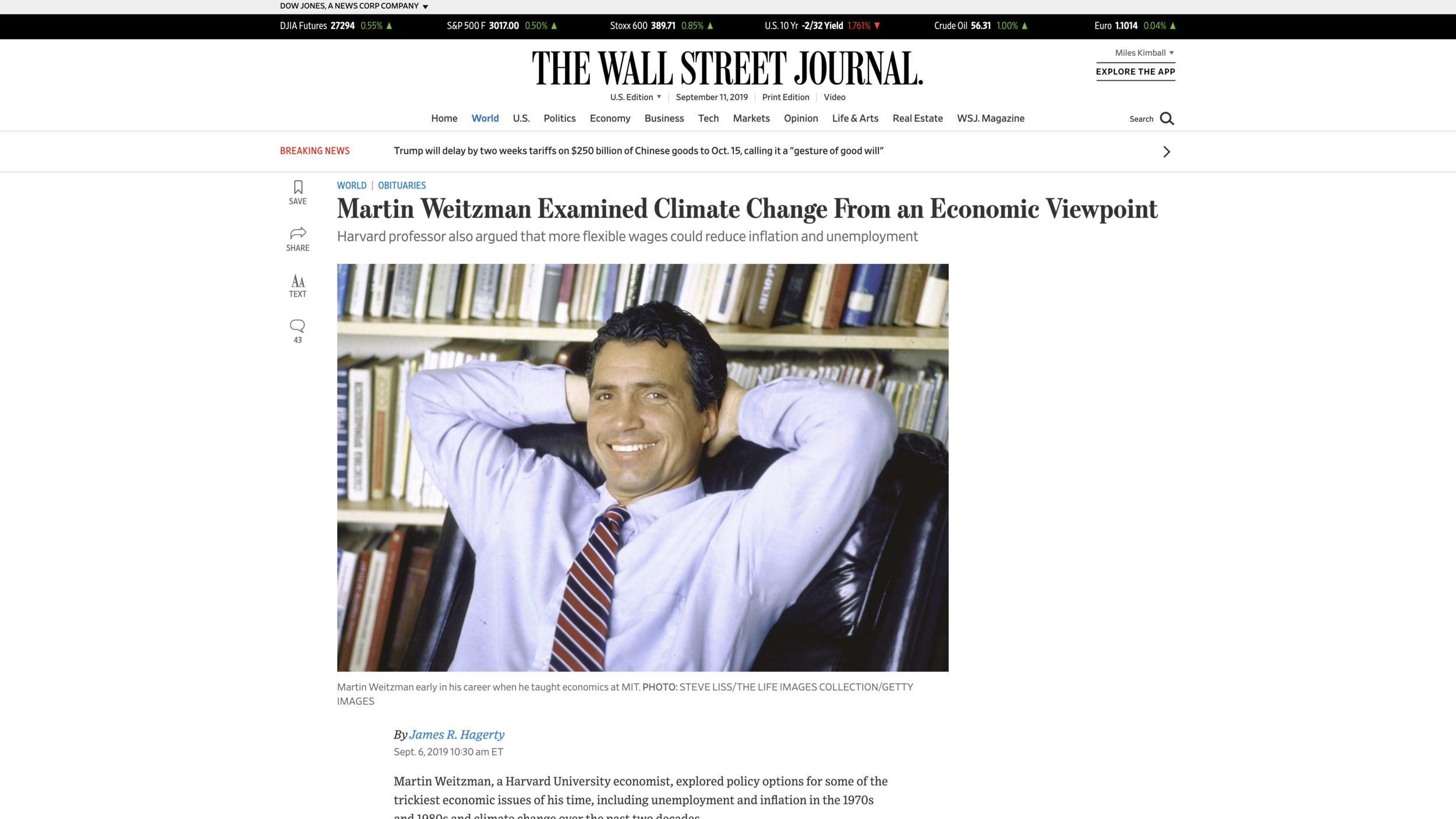In Honor of Martin Weitzman
In “Why I am a Macroeconomist: Increasing Returns and Unemployment” I write:
… during the first few months of calendar 1985, I stumbled across Martin Weitzman’s paper “Increasing Returns and the Foundations of Unemployment Theory” in the Economics Department library. Marty’s paper made me decide to be a macroeconomist.
I am also a big fan of Martin’s book The Share Economy. It should be required reading for all macroeconomists. (I mention it in my posts “The Costs and Benefits of Repealing the Zero Lower Bound...and Then Lowering the Long-Run Inflation Target” and “The Equilibrium Paradox: Somebody Has to Do It.”)
I met Martin in person only when he came to give a seminar at the University of Michigan about how agnosticism about the true variance of asset prices could explain the equity premium puzzle. After a long argument over dinner, I came to think he was applying Humean skepticism to asset pricing, but that what really mattered was what investors actually had in their minds—which is something we can in principle establish with survey measures of expectations. (Existing survey measures of expectations on the Health and Retirement Study actually show that most people think the mean return on the stock market is quite low. The particular survey questions don’t really tell much about people’s expectations of the tail extremes.)
Suffice it to say that Martin Weitzman has had a big influence on me in my professional life. So I am saddened that he, like Alan Krueger (see “In Honor of Alan Krueger”) is dead at his own hand. The Wall Street Journal article shown above says tersely:
Prof. Weitzman died Aug. 27 in what the Massachusetts medical examiner determined was a suicide. He was 77 years old.
That article says this about The Share Economy:
His 1984 book, “The Share Economy,” caught the attention of politicians searching for ways to prevent the economy from lurching from periods of rapid inflation to spells of high unemployment. He believed inflationary pressures would abate and companies would be less likely to lay off workers in bad times if wages could be adjusted down as well as up, depending on profits.
“The major macroeconomic problems of our day can be traced back ultimately to the wage system,” he said at a political forum in 1987. “We try to award every worker a predetermined piece of the income pie before it’s out of the oven, before the size of the pie is even known.”
On his work on climate change, I like Holman Jenkin’s discussion in “CNN Climate Show Wasn’t Just Boring,” which also appeared on September 6, 2019. Holman writes:
… the shocking suicide of Harvard climate economist Martin Weitzman, rightly praised in obituaries for an insight lacking in the CNN town hall: A climate disaster is far from guaranteed. It’s the low but not insignificant chance of a “fat tail” worst-case disaster that we should worry about. (Mr. Weitzman put the odds at 3% to 10%.)
It comes as Weitzman’s student, collaborator and co-author, Gernot Wagner, tellingly has focused his own attention lately on geoengineering rather than the seemingly lost cause of carbon reduction.
The logic here is that if things get really, really bad, so that the world is getting as hot as hell, then we should not, and will not reject geoengineering out of hand. As Holman puts it:
So to answer CNN’s non-debate and the worries of the late Prof. Weitzman, if the small but not negligible chance of a climate catastrophe is borne out, we already know what the answer is going to be: to throw a bunch of particles into the atmosphere, at a cost of perhaps $2 billion a year, in order to block the estimated 1% of sunlight necessary to keep earth’s temperature in check.
Elizabeth Warren mentioned a policy action to tame climate change that Martin pushed forward: a carbon tax. Holman writes:
… Elizabeth Warren had an interesting moment when she admonished a network personality for trying to rile up viewers “around your light bulbs, around your straws and around your cheeseburgers.”
…
As the New York Times also noted, “For the first time, Ms. Warren explicitly embraced a carbon tax before quickly pivoting away . . .”
What’s Ms. Warren afraid of? A carbon tax would hardly be prohibitive. Weitzman advocated $40 a ton—the equivalent of 36 cents per gallon of gasoline. Such a tax could be implemented without raising the overall tax burden; it could be used to trim taxes on work, saving and investment, improving the economy overall. It could be embraced and copied by other nations out of self-interest rather than self-abnegation (unlike the absurd Green New Deal).
Short of a carbon tax or tradable carbon dioxide permits in limited supply, right now the most honest, effective way of reducing the amount of carbon dioxide we put into the atmosphere would be to ban the burning of coal worldwide. Politically, demonizing coal is an achievable and laudable goal that would do a lot more good than many, mostly symbolic policy measures that are being taken now.
What connects Martin’s work on taming climate change and his work on taming the business cycle was a penchant for attacking hard problems. The article at the top of this post says this:
“I’m drawn to things that are conceptually unclear, where it’s not clear how you want to make your way through this maze,” he said at a 2018 Harvard seminar honoring his career.
We need trailblazers like Martin. It is sad that we now have one fewer on our troubled planet.
